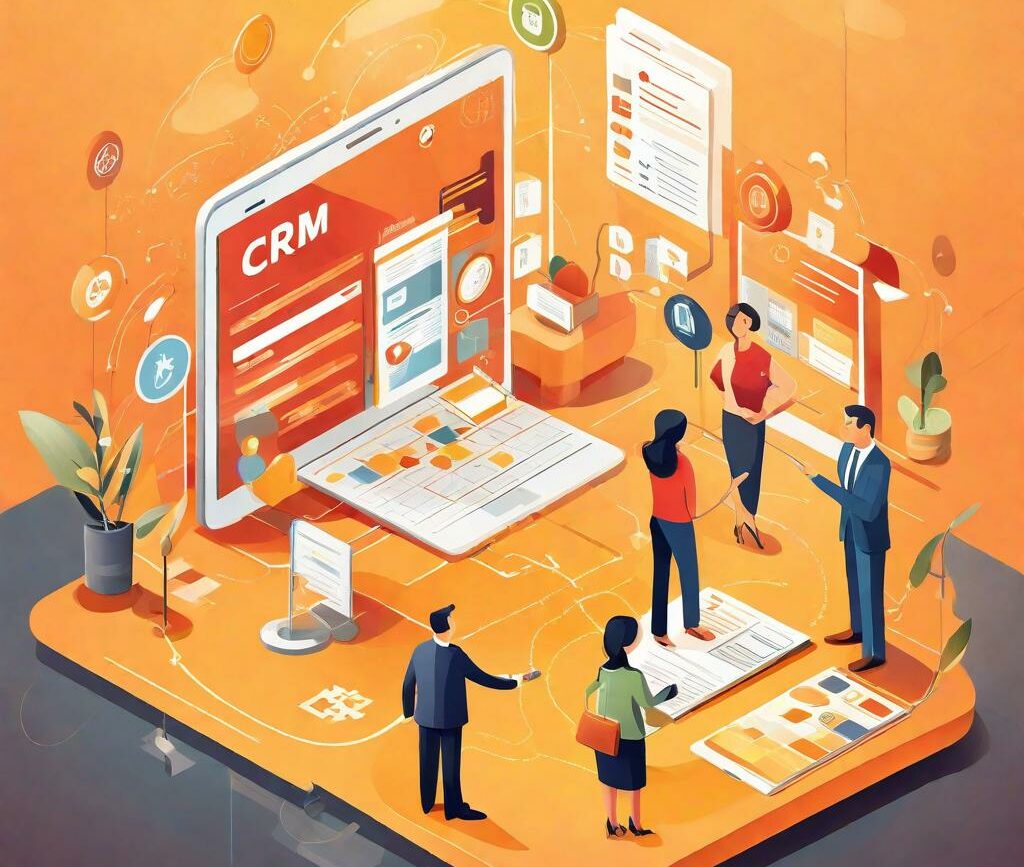In estate agency marketing, CRM tools are used to gather and analyze customer data, facilitate communication, and provide personalized experiences for homebuyers and sellers. In today’s competitive real estate market, CRM is essential for differentiating agencies and building strong customer connections.
What is Customer Relationship Management?
1. Understanding the concept of CRM
Customer Relationship Management (CRM) refers to the strategies and practices implemented by businesses to effectively manage and nurture relationships with their customers. In the context of estate agency marketing, CRM involves utilizing tools and techniques to gather and analyze customer data, establish effective communication channels, and ultimately provide a personalized and seamless experience for potential homebuyers and sellers.
2. Importance of CRM in today’s competitive landscape
In today’s highly competitive real estate market, it is crucial for estate agencies to differentiate themselves and build meaningful connections with their customers. CRM provides a framework for understanding customer needs and preferences, allowing agencies to tailor their marketing efforts accordingly. By leveraging CRM, estate agencies can gain a competitive edge and establish themselves as trusted advisors to their clients.
3. Benefits of implementing CRM in estate agency marketing
The implementation of CRM in estate agency marketing offers numerous benefits. Firstly, it allows agencies to gather and manage customer data in a centralized and organized manner. This ensures that the information is accurate, up-to-date, and easily accessible for marketing and sales teams. Secondly, by analyzing customer insights, estate agencies can create comprehensive customer profiles that enable personalized marketing strategies. This helps agencies to target the right audience effectively and increase the chances of conversion. Lastly, by establishing effective communication channels, estate agencies can nurture leads and maintain ongoing customer relationships, thereby enhancing customer satisfaction and retention rates.
Key Components of Effective CRM
1. Gathering and managing customer data
Accurate and up-to-date customer data is the foundation of effective CRM. Estate agencies must ensure that the information they collect is reliable and relevant. This data can include demographic details, contact information, preferences, and past interactions. To gather this information, agencies can employ various methods, such as online forms, surveys, and database integration with property listing websites. It is crucial to prioritize data security and privacy to build trust with customers and comply with data protection regulations.
2. Analyzing customer insights for personalized marketing
Once estate agencies have collected customer data, they can analyze it to gain valuable insights. This analysis involves creating customer profiles based on demographics, preferences, and behavior patterns. By utilizing data analytics tools, such as CRM software and predictive analytics models, agencies can identify trends and make informed marketing decisions. Segmenting customers based on specific criteria, such as location or property preferences, allows for highly targeted campaigns that resonate with individual customers.
3. Establishing effective communication channels
In order to connect with potential homebuyers and sellers, estate agencies need to establish reliable and efficient communication channels. Email marketing and newsletters act as effective tools for delivering relevant content, property listings, and market updates directly to customers’ inboxes. Leveraging social media platforms, such as Facebook and Twitter, enables agencies to engage with a wider audience and foster a sense of community. Personalized messaging can be achieved through automation, where emails and messages are triggered based on customer interactions and preferences.
Enhancing Customer Experience through CRM in Estate Agency Marketing
Enhancing Lead Generation and Nurturing
1. Implementing CRM for effective lead management
CRM tools enable estate agencies to streamline their lead capture and follow-up processes. By integrating lead capture forms on their website or landing pages, agencies can collect potential customers’ contact information and preferences. CRM software organizes this data and provides a centralized platform for managing and tracking leads. Automated lead follow-up processes ensure that leads receive timely and personalized communication, increasing the chances of conversion.
2. Personalized communication for lead nurturing
With CRM, estate agencies can tailor their marketing messages to align with individual customer preferences. By analyzing customer data, agencies can understand customers’ specific needs and interests, allowing for personalized and targeted communication. Customizing email campaigns based on customer interests and behaviors ensures that every interaction is relevant and engaging. This personalized approach builds trust and keeps potential clients engaged throughout the homebuying or selling journey.
3. Automating lead scoring and prioritization
CRM systems also assist in lead scoring and prioritization, enabling estate agencies to identify high-potential leads and allocate resources accordingly. By assigning scores based on lead interactions, behavior, and demographics, agencies can focus their efforts on leads that are most likely to convert. This optimization of resources improves efficiency and maximizes conversion rates, resulting in higher overall sales and revenue.
Strengthening Customer Engagement and Retention
1. Building lasting customer relationships
CRM plays a pivotal role in strengthening customer relationships and fostering trust and loyalty. Estate agencies can gather customer feedback and preferences through surveys, feedback forms, and direct communication. By analyzing this data, agencies gain insights into customer needs and can cater their services to exceed expectations. Personalizing interactions through CRM tools enables agencies to provide tailored recommendations, advice, and support. Investing in effective customer service, with the help of CRM, allows agencies to build long-lasting relationships and stand out in a competitive market.
2. Implementing proactive follow-ups and reminders
CRM enables estate agencies to maintain regular communication customers throughout their homebuying or selling journey. By segmenting customers based on criteria such their stage in the process, agencies can provide meaningful check-ins and updates based on their specific needs. Reminders for important milestones, such as property viewings or contract signings, can be automated to ensure that no opportunity is missed. This proactive approach demonstrates care and attention to detail, enhancing the overall customer experience.
3. Effective cross-selling and upselling opportunities
With a wealth of customer data available, estate agencies can utilize CRM to identify additional property recommendations for existing customers. By understanding their preferences and past interactions, agencies can deliver personalized suggestions that align with customers’ needs and desires. Furthermore, CRM facilitates the implementation of targeted promotions and offers. By analyzing customer behavior and purchase history, agencies can tailor promotions and incentives to specific customer segments, boosting engagement, and increasing sales.
Measuring and Evaluating the Success of CRM in Estate Agency Marketing
Key Metrics for Assessing CRM Effectiveness
Estate agencies can assess the effectiveness of their CRM strategies through various key metrics. Conversion rates and sales growth serve as indicators of how successful the agency is in converting leads into actual customers. Customer satisfaction and retention rates provide insights into the strength of customer relationships and loyalty. Additionally, monitoring lead response time and follow-up efficiency ensures that processes are optimized for prompt and effective communication with potential clients.
Utilizing CRM Analytics for Continuous Improvement
CRM analytics allows estate agencies to gain deeper insight into customer behavior and engagement. By tracking website visits, property search patterns, email open rates, and click-through rates, agencies can identify trends and areas for improvement. This data-driven approach helps agencies optimize their marketing strategies, website design, and customer service processes to ensure maximum effectiveness and efficiency.
Adapting and Optimizing CRM Strategies
To stay ahead of the curve and meet changing customer preferences, estate agencies must adapt and optimize their CRM strategies. Incorporating customer feedback and suggestions ensures continuous enhancement of the customer experience. Monitoring market trends and competition helps agencies stay informed about industry developments and best practices. By leveraging customer insights and market knowledge, estate agencies can evolve their CRM strategies to deliver personalized and relevant experiences that resonate with their target audience.
Summary and FAQs
Summary:
In summary, implementing Customer Relationship Management (CRM) can significantly enhance estate agency marketing strategies. Through effective data gathering and management, personalized marketing efforts, and establishing robust communication channels, estate agencies can improve lead generation, lead nurturing, customer engagement, and retention. By measuring key metrics and utilizing CRM analytics, agencies can continuously refine their strategies for optimal results.
FAQs:
What are the major benefits of implementing CRM in estate agency marketing?
Implementing CRM in estate agency marketing offers benefits such as improved lead management, personalized marketing efforts, enhanced customer engagement, and increased customer satisfaction and retention rates.
How can CRM enhance lead generation and nurturing?
CRM facilitates effective lead capture, follow-up processes, and personalized communication, resulting in improved lead nurturing and increased conversion rates.
What strategies can be employed to strengthen customer engagement and retention?
Strategies to strengthen customer engagement and retention include analyzing customer feedback and preferences, personalizing interactions, providing proactive follow-ups and reminders, and utilizing targeted cross-selling and upselling opportunities.
Which metrics should estate agencies track to assess the effectiveness of CRM?
Estate agencies should track metrics such as conversion rates, sales growth, customer satisfaction and retention rates, and lead response time and follow-up efficiency to assess the effectiveness of CRM.
How can estate agencies adapt and optimize their CRM strategies based on changing customer preferences and market trends?
Estate agencies can adapt and optimize their CRM strategies by incorporating customer feedback, monitoring market trends and competition, and evolving their strategies to align with changing customer preferences and needs.
With the implementation of CRM, estate agencies can revolutionize their marketing efforts, build lasting customer relationships, and drive business growth in the competitive real estate market. By leveraging the power of personalization, effective communication, and data-driven insights, estate agencies can connect with their target audience in a meaningful and impactful way.





